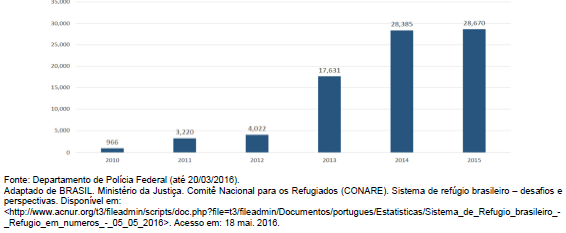Questões de Vestibular PUC - PR 2016 para Vestibular - Primeiro Semestre
Foram encontradas 60 questões
Analise o gráfico a seguir.
Solicitações de refúgio - Brasil
(entradas por ano, 2010-2015)

Read the text and choose the CORRECT option.
Portable devices
Buddy, can you spare a watt?
Trading power could free users from dead-battery tyranny
ONE of the most annoying features of smartphones is that they run out of power just when you need it most. After a day of e-mailing, streaming music, downloading podcasts, watching cat videos and snapping selfies, a device can easily be left without enough charge to make an emergency call. What would help, reckons Paul Worgan of the University of Bristol, in England, is to give portable devices the ability to share some of their power.
Mr Worgan and his colleagues have come up with a wireless-charging system which they call PowerShake. To use it someone holds a phone with an expiring battery against another device—a phone, or even a smartwatch or a fitness band—and this initiates a power transfer from one to the other. Some 12 seconds of contact provides enough juice to make a one-minute telephone call. One minute of contact would allow, say, a four minute music video to be watched. The researchers will present their idea to CHI2016, a conference on computer-human interaction, in San Jose, California, in May.
Available in:<http://www.economist.com/news/science-and-technology/21697800-trading-power-could-free-users-dead-batterytyranny-buddy-can-you-spare>
I. New smartphones will have power to spare.
II. PowerShake wireless-charging system will help you to charge your out of power smartphone.
III. You have to plug in both phones for 12 seconds.
IV. This new feature will allow you to make a short phone call.
V. The researchers will present this new idea at their university, in San Jose, California.